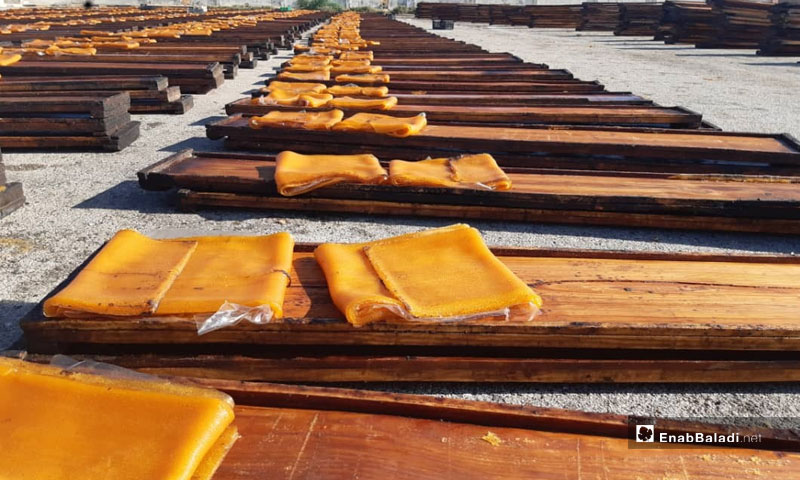



In late March 2018, aboard the buses of displacement, heading to Syria’s northern and north-western areas, Ghouta’s people carried their worries and the fatigue of many years of besiegement to their forced choice of a destination, unforgetful of their crafts and the professions they are famed for.
The north was not in a better state, for it also bore witness to war and non-stop clashes while serving as a space for unemployment and poverty. Despite this, the displaced persons quickly adjusted to the new pace of life; craftsman and artisans began to revive what they were good at, establishing workshops, factories and shops, which soon began to operate.
Some of Eastern Ghouta’s internally displaced persons (IDPs), known for making dried fruit, preserved foods and jams, started opening Qamar al-Din industrial workshops in Syria’s north — two workshops in Afrin city and another in Sarmin town, northern Idlib countryside.
Relying on their experience in making Qamar al-Din, a profession they inherited from parents and grandparents, Yahia Hashim said that a group of young men, displaced from Irbin city in eastern Ghouta, Rif Dimashq, started operating Qamar al-Din workshops.
Yehia Hashim, who also works in the manufacture of Qamar al-Din in Syria’s north, added that Afrin is the market for this industry’s raw material, were apricots are grown in larger amounts compared with areas in Syria’s north, noting that they are not as good as the apricots cultivated in Ghouta’s farms, “but they meet the purpose.”
Manufactured Qamar al-Din is mostly found in Homs and Hama, northern Syria, but, according to Hashim, it does not have the same quality of that manufactured in Ghouta.
“When a group of people, displaced from Irbin, operated a workshop for the manufacturer of Qamar al-Din in Afrin, the drink returned to the table of many of the IDPs last Ramadan, as is customary,” he added.
Issam al-Raya, one of southern rural Idlib’s residents, resumed his profession, he practiced in eastern Ghouta, after ten years of interruption.
Al-Raya informed Enab Baladi of the steps followed in making Qamar al-Din, which starts with harvesting apricots, washing the fruits and, then, packing them in small boxes inside a small room, called ‘steamer.’
Apricots are dehydrated, using steam emanating from burning the flowers of sulfur, used for the sterilization of apricots and refining them from impurities and pests. Then, the apricots are put into the peeling machine, where the skin is removed.
The apricots, in the next step, are squeezed and the kernels are removed. The sugar syrup is added to the squeezed apricots with constant stirring and then strained four times.
Next, the thick liquid of apricot is spread on wooden boards, sprinkled with olive oil so the taste of the product would not get affected, by specialists who leave them to dry in direct sunlight from four to five days.
When it is all dried up, the apricot liquid is made into a paste, flattened, chopped, packaged and offered for sale.
These steps, according to Issam al-Raya, take several weeks, and the pre-drying steps require skill in pouring the juice onto the wooden boards in equal amounts to obtain consistent layers of Qamar al-Din paste.
Mahrous Menaineh, one of Qamar al-Din’s traders and manufacturers in Syria’s north, pointed out that the Qamar al-Din industry is experiencing some difficulties, especially in marketing. In fact, Eastern Ghouta was absent during the years of siege from the foreign exchange market, while it used to export the product to Egypt, the Gulf States, Turkey, Pakistan and the States of the Maghreb.
if you think the article contain wrong information or you have additional details Send Correction